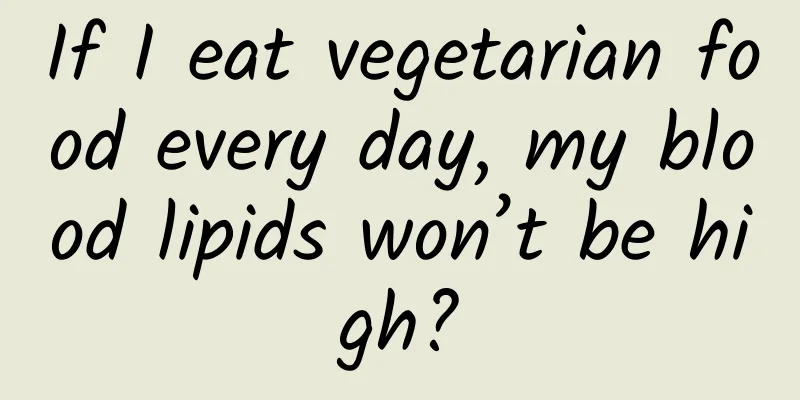If I eat vegetarian food every day, my blood lipids won’t be high?

|
Rumor: "If you eat vegetarian food every day, your blood lipids won't be high?" Many people believe that if you have high blood lipids, you should eat less meat, less oil, and more vegetables. Many people even only eat vegetarian food and do not eat any meat. Rumor Analysis This statement is not correct. Eating only vegetarian food may not necessarily lower blood lipids, and may also cause protein deficiency. In fact, meat is not only hidden in fat, some seemingly vegetarian foods, such as cakes, melon seeds and other foods, themselves contain high fat. In addition, cooking methods such as frying and deep-frying will also add a lot of oil to the food. If we consume too much carbohydrates, our body will also synthesize triglycerides, which is an important component of blood lipids. Meat is an important source of protein for us. We should not regard meat as a scourge. We should follow the doctor's advice and have a balanced diet. As one of the three highs, high blood lipids are the most familiar stranger to us. We say it is familiar because there are too many people with high blood lipids, one in three people (the overall prevalence rate is 35.6%) . We say it is strange because many people do not know much about blood lipids and do not know what to pay attention to. Some people think that if they "eat vegetarian food" every day, their blood lipids will definitely go down, and they are not moved even when faced with a large table of fish and meat during festivals. In fact, eating only vegetarian food does not necessarily solve the problem of blood lipids. Although some people eat vegetarian food every day, their blood lipids are still very high and they may lack certain nutrients. However, some people have a combination of meat and vegetables and their blood lipids are also normal. What is going on? Should we insist on being a vegetarian? Let's talk about it below. Vegetarian food also contains a lot of fat 1 Some foods are inherently high in fat When it comes to fat, many people only think of meat. But in fact, fat exists in almost all foods on the table and during meals, such as various cakes and biscuits, snacks, melon seeds, peanuts, walnuts and other nuts and other small snacks, all contain fat, and some of these foods have a high fat content . Therefore, even if many people do not eat meat in March, they actually consume a lot of fat. The nutritional composition table of a certain brand of potato chips shows that 30 grams of potato chips have 10.2 grams of fat, and the fat content accounts for 34% 2 Some cooking methods are high in fat Cooking methods such as stir-frying, deep-frying, and pan-frying use a lot of oil . Especially when deep-frying repeatedly, the oil is heated to smoke, which will produce trans fatty acids. These are what we usually call " bad fatty acids ", which can cause plaques in blood vessels and even block blood vessels, leading to myocardial infarction and cerebral infarction, which is more harmful. 3 "Invisible Oil" in Food Time is like a sponge, you can squeeze it and it will always come out, and so does oil. Some foods have many holes in them, and these holes can absorb oil during the cooking process, causing the oil content of the food to increase . The same is true for vegetables. After frying green vegetables, a plate of oil flowers will be finished, but the eggplant will disappear after a few fryings. Although eggplant looks like it doesn't have much oil, it actually contains as much oil as green vegetables. In addition, bread slices, steamed bread slices, tofu puffs, lotus roots and potato slices, as well as foods coated with batter or starch, are also easy to absorb oil. Staple foods will also turn into fat The carbohydrates in staple foods are essential as an important source of energy for the human body. However, most of the fiber, vitamins and minerals are removed during the processing of steamed bread, porridge, white bread, noodles, cakes, etc. The carbohydrates in them are mainly sugar and quickly released starch. When the human body consumes a large amount of carbohydrates, the excess carbohydrates will be converted into triglycerides in the body . Triglycerides are one of the important indicators to measure whether blood lipids are normal or not. They are a stored source of calories and are also one of the important risk factors for high blood lipids. Meat contains high-quality protein and has a high digestibility and absorption rate. Meat is also an important source of vitamins and trace elements, especially iron and vitamin B12. Long-term vegetarianism may lead to a deficiency of these two nutrients, increasing the risk of anemia and osteoporosis. The protein in meat helps maintain muscle mass, which is very important for people of all ages. It can be said that meat is an important guarantee for maintaining health . The acquisition of high-quality protein in the diet is closely related to the daily intake of meat, eggs, milk, and soybeans. Eating only vegetarian food may not be completely healthy . 1 Whole grains are recommended as staple foods Whole grain carbohydrates or coarse grains, such as sweet potatoes, corn, multi-grain steamed buns, whole wheat bread, brown rice, etc., not only contain a variety of vitamins, dietary fiber, etc., but also have a lower glycemic index than refined grains, and postprandial blood sugar is more stable, which is also more conducive to preventing chronic metabolic diseases such as diabetes. Copyrighted stock images, no reproduction is authorized Carbohydrate intake should account for 50% to 60% of total energy. Taking an adult's daily energy intake of 1800 to 2000 kcal as an example, this is equivalent to a daily carbohydrate intake of between 225 and 300g. Don’t just focus on refined rice and flour in your diet, remember to add some color to your table! Whole grains such as millet, corn, and oats, whole beans such as red beans, mung beans, and kidney beans, as well as potatoes, are all treasure troves of dietary fiber that can help you easily clear the bad cholesterol in your intestines. 2 Choose meats that are low in fat However, for animal protein intake, you can appropriately choose fish, shrimp, skinless poultry, lean meat, etc. with low fat content. It can be simply remembered that red meat (beef, mutton, and pork) is not as good as white meat (poultry, seafood), meat with more legs (beef, mutton, and pork) is not as good as meat with fewer legs (poultry, seafood), and the inside (offal) is not as good as the outside (muscle); in addition, milk, eggs, and beans are also good sources of protein. 3 Choose low-fat cooking methods When cooking, try to stew, steam, blanch, boil, mix, and simmer. Even when frying, do not wait until the oil smokes before putting it in the pan. Cut the ingredients larger and thicker to reduce oil absorption. Fried foods can be placed on oil-absorbing paper and squeezed to remove oil before eating. 4 Eat less high-fat snacks Eat less high-fat snacks, especially those containing "bad fats", such as biscuits, cookies, cakes, egg tarts, puff pastry and other baked goods, potato chips, rice crackers and other snacks, and various layered pastry pastries and snacks. The crispier, softer and more greasy these snacks are, the more saturated fat they tend to contain. Looking in the mirror of rumors "Eating more meat will make you fatter, eating more oil will increase your blood lipids." In life, we will encounter many such inferences that seem to be in line with common sense and intuitive at first glance, but the fact is not so. The human body is not a simple "container" that will store anything if you add more of it. The human body has its own physiological activities and metabolic laws. There are many substances that exist in food and can be synthesized by our own body, and the regulation process is also relatively complicated. However, in life, we only need to remember a simple principle - for ordinary people, the richer the food variety, the more balanced and healthy the nutrition can be. Planning and production Author | Xu Ke, attending physician of the Department of Endocrinology, the First Affiliated Hospital of Wenzhou Medical University Review | Ruan Guangfeng Director of Science and Technology Department, Kexin Food and Nutrition Information Exchange Center |
<<: Will keeping long hair during pregnancy compete for nutrition for the baby?
Recommend
What to do if a woman's vagina is loose? 6 tips to tighten it
Female friends who have experienced vaginal expan...
20 questions and answers on myopia prevention and control in multiple scenarios!
In order to guide children and adolescents to use...
Should you wear clothes or undress when you have a fever?
►In fact, fever is divided into three stages: the...
What is the phenomenon of photosynthesis in green plants? What are the products of photosynthesis?
In nature, plants are called producers in the foo...
Why does my lower abdomen hurt during menstruation?
Abdominal pain after menstruation is a common phe...
How do women clean their vagina?
Vaginal cleaning is very helpful for female frien...
Positive! Union Hospital experts said that if you have elderly people at home, you should seek medical attention immediately if you encounter these 8 situations...
A 76-year-old man was infected with the new coron...
How to relieve lower abdominal cramps during menstruation?
Many women are born with cold and weak bodies. Th...
Can I eat while doing a pregnancy test?
Pre-pregnancy check-up is very important. For cou...
Is high-intensity interval training more effective for weight loss than moderate-intensity continuous exercise?
Award-winning works of the Health Management Comm...
Eating one more bite of this kind of meat every day will increase your risk of cardiovascular disease and diabetes
We often hear that eating too much red meat and p...
What happens if you remove your uterus?
Many diseases are untreatable for patients, and t...
What to do if you get eczema from using sanitary napkins
Girls have three to five days every month. Or a w...
Brown bleeding in early pregnancy
The early stages of pregnancy refer to the time w...
What should I pay attention to during moxibustion? Why should I drink more water after moxibustion?
When using moxibustion to regulate, you must be p...









